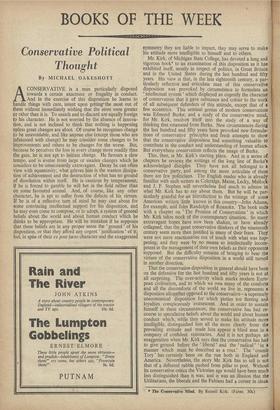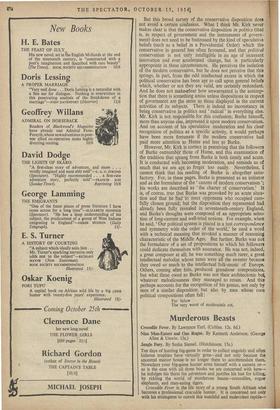BOOKS OF THE WEEK
Conservative Political Thought
By MICHAEL OAKESHOTT , ACONSERVATIVE is a man particularly disposed towards a certain exactness or frugality in conduct. And in the exercise of this disposition he learns to brindle things with care, intent upon getting-the most out of them without immediately wishing that the store were greater pr other than it is. To snatch and to discard are equally foreign to his character. He is not worried by the absence of innova- tion, and is not inclined to think, that nothing is happening Unless great changes are afoot. Of course he recognises change to be unavoidable, and like anyone else (except those who are infatuated with change) he may consider some changes to be improvements and others to be changes for the worse. But, because he perceives the loss in every change more readily than the gain, he is not apt to initiate change. He favours a slow tempo, and is averse from large or sudden changes which he considers to be unnecessarily extravagant. Decay he can often view with equanimity; what grieves him is the wanton dissipa- tion of achievement and the destruction of what has no ground of dissolution within itself. He is cautious by temperament; if he is forced to gamble he will bet in the field rather than on some favoured animal. And, of course, like any other character, he is apt to suffer from the defects of his virtues. If he is of a reflective turn of mind he may cast about for some convincing intellectual support for his disposition, and he may even come to compose, or to adopt, a system of general beliefs about the world and about human conduct which he thinks to be appropriate. He will be mistaken if he supposes that these beliefs are in any proper sense the ' ground' of his disposition, or that they afford any cogent ' justification' of it; but, in spite of their ex post facto character and the exaggerated symmetry they are liable to impart, they may serve to make his attitude more intelligible to himself and to others.
Mr. Kirk, of Michigan State College, has devoted a long and vigorous book* to an examination of this disposition as it has exhibited itself, mostly in respect of politics, in Great Britain and in the United States during the last hundred and fifty years. His view is that, in the late eighteenth century, a par- ticularly reflective and articulate man of this conservative disposition was provoked by circumstance to formulate an ' intellectual system ' which displayed so cogently the character of conservatism that it gave substance and colour to the work of all subsequent defenders of this attitude, except that of a few eccentrics. This seminal genius of modern conservatism was Edmund Burke; and a study of the conservrttive mind, for Mr. Kirk, resolves itself into the study of a way of thinking that emanated from Burke. New circumstances during the last hundred and fifty years have provoked new -formula. tions of conservative principles and fresh attempts to show that the conservative disposition had something valuable to contribute in the conduct and understanding. of human affairs But everywhere conservatism reflects the image of Burke. This, then, is Mr. Kirk's starting place. And in a series of chapters he reviews the writings of the long line of Burke's acknowledged disciples. They - have not all belonged to a conservative party, and among the more articulate of them there are few politicians. The English reader who is already familiar with such writers as Coleridge, Maine, Lecky. Mallock and J. F. Stephen will nevertheless find much to admire in what Mr. Kirk has to say about them. But he will be par- ticularly grateful for an introduction to the writings of some American writers little known in this country—John Adams, for example, and John Randolph of Roanoke. The book ends with a chapter on ' The Promise of Conservatism' in which Mr. Kirk takes stock of the contemporary situation. So many extravagant hopes have now been shaken, or have already collapsed, that the great conservative thinkers of the nineteenth century seem more than justified in many of their fears. They were not mere reactionaries out of touch with what was hap- pening; and they were by no means so intellectually incom- petent in the management of their own beliefs as their opponent, supposed. But the difficulty remains of bringing to bear the virtues of the conservative disposition in a world still turned in another direction.
That the conservative disposition in general should have been on the defensive for the last hundred and fifty years is not at all surprising. The over-activity which marks modern Euro pean civilisation, and to which we owe many of the comforts and all the discomforts of the world we live in, represents a disposition altogether opposed to the conservative—a supremely uneconomical disposition for which pieties are fleeting and loyalties conspicuously 'evanescent. And in order to sustain himself in these circumstances, the conservative has had re- course to speculative beliefs about the world and about human conduct which, while they served to make his attitude more intelligible, distinguished him all the more clearly from the prevailing attitude and made him appear a blind man in a company of confident visionaries. And it is not perhaps an exaggeration when Mr. Kirk says that the conservative has had to give ground before the liberal' and the ' radical'' ' in a manner which must be described as a rout.' The cosmiC Tory ' has certainly been on the run both in England and America. Nevertheless, the story Mr. ,Kirk has to tell is not that of a defeated rabble pushed from pillar to post. Without its conservative critics the Victorian age would have been much less distinguished than it was; and it was an illusion that the Utilitarians, the liberals and the Fabians had a corner in ideas.
• The Conservative Mind. By Russell Kirk. (Faber. 30s.)
not avoid a certain confusion. What I think Mr. Kirk never makes clear is that the conservative disposition in politics (that is, in respect of government and the instruments of govern- ment) does not need to be buttressed by the kind of speculative beliefs (such as a belief in a Providential Order) which the conservative in general has often favoured, and that political conservatism is not only intelligible in an age of incessant innovation and ever accelerated change, but is particularly appropriate in these circumstances. He perceives the isolation of the modern conservative, but he does not perceive that this springs, in part, from the odd intellectual excess in which the political conservative has been apt to call upon general beliefs which, whether or not they are valid, are certainly redundant. And he does not makeiclear how unwarranted is the assump- tion that there is something amiss unless dispositions in respect of government are the same as those displayed in the current activities of its subjects. There is indeed no inconstancy in being conservative in politics and radical' in everything else. Mr. Kirk is not responsible for this confusion; Burke himself, more than anyone else, impressed it upon modern conservatism. And on account of his speculative moderation and his clear recognition of politics as a specific activity, it would perhaps have been more fortunate if the modern conservative had paid more attention to Hume and less to Burke.
However, Mr. Kirk is correct in perceiving that the followers of Burke outnumber those of Hume, and this examination of the tradition that sprang from Burke is both timely and acute. It is conducted with becoming moderation, and reminds us of much that we are apt to forget too easily. Nevertheless, I cannot think that his reading of Burke is altogether satis- factory. For, in these pages, Burke is presented as an initiator and as the formulator of the canons of modern conservatism '; his works are described as the charter of conservatism.' It is, of course, true that Burke was provoked by an acute situa- tion and that he had to meet opponents who occupied care- fully chosen ground; but the disposition they represented had already been fully revealed in seventeenth-century England, and Burke's thoughts were composed of an appropriate selec- tion of long-current and well-tried notions. For example, when he said, Our political system is placed in a just correspondence and symmetry with the order of the world,' he used a word with a technical meaning that invoked a manner of reasoning characteristic of the Middle Ages. But further, Burke was not the formulator of a set of propositions to which his followers could dedicate themselves with assurance. He was not, indeed, a great composer at all; he was something much rarer, a great intellectual melodist whose tunes were all the sweeter because they owed so much to the intellectual folk-music of Europe. Others, coming after him, produced grandiose compositions, but what these owed to Burke was not their architectonic but whatever melodiousness they managed to retain. And this perhaps accounts for the recognition of his genius, not only by men of a similar disposition, but also by men whose own political compositions often fall:
Far below The very worst of modernistic rot.



































 Previous page
Previous page